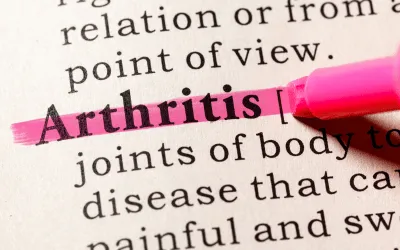About Arthritis
As the nation’s #1 cause of disability, arthritis affects nearly 60 million adults and 300,000 children. Over 100 types of arthritis and related conditions damage the joints and often other organs.
How can we assist you?
Helpful Tools for You

The Role of Stress in Arthritis Flares: Managing Emotional Well-being
Stress can exacerbate arthritis flares due to an intensified inflammatory response. This leads to a cycle where arthritis pain causes stress, further worsening symptoms. Prioritizing emotional well-being through techniques like mindfulness can help manage stress and mitigate its impact on arthritis, thereby improving the overall quality of life.
How stress affects the body and can exacerbate arthritis symptoms.
It is a normal physiological response to perceived threats or challenges. When stressed, our bodies release hormones like cortisol and adrenaline that prepare us to either fight or flee - the so-called "fight or flight" response. This leads to various physical changes, including increased heart rate, blood pressure, and heightened alertness.
For individuals with arthritis, however, stress can have an additional, negative impact. Chronic stress keeps the body in a constant state of readiness, causing a sustained release of these stress hormones. This can disrupt various body functions and lead to a state of inflammation.
Arthritis, an inflammatory condition, can be exacerbated by this heightened inflammatory response. Increased inflammation can cause more swelling in the joints, leading to increased pain, stiffness, and reduced mobility - the typical symptoms of an arthritis flare.
In addition, stress can indirectly exacerbate arthritis symptoms. When stressed, people may not sleep well, eat unhealthy food, or skip physical activity, all of which can negatively affect arthritis symptoms. By managing stress effectively, it's possible to reduce both the direct and indirect impact it has on arthritis.
The Impact of Stress on Arthritis
Stress can contribute to arthritis symptoms in both direct and indirect ways.
Physiologically, stress triggers the body's "fight or flight" response, leading to the release of hormones like cortisol and adrenaline. While these hormones help us manage short-term threats, long-term stress leads to a chronic release of these hormones. This chronic stress response can disrupt the body's normal functions and exacerbate inflammatory responses.
For someone with arthritis, a condition characterized by inflammation, this heightened inflammatory response can trigger more severe symptoms. Increased inflammation can result in more swelling in the joints, leading to intensified pain, stiffness, and reduced mobility - classic indicators of an arthritis flare.
An example of this direct impact could be a person who starts a new job with higher levels of responsibility and stress. They might notice that their arthritis symptoms have worsened, with more frequent or severe flares, corresponding with their increased stress levels.
Indirect Impact of Stress on Arthritis
Stress can also indirectly affect arthritis symptoms. When people are stressed, their habits and behaviors often change. They may sleep less, exercise less, and eat unhealthier foods. These changes can lead to weight gain, reduce the body's natural defenses, and ultimately intensify arthritis symptoms.
For instance, consider a person who is dealing with a stressful life event, like a family crisis. They might find themselves sleeping poorly and reaching for convenient, often unhealthy, food options due to a lack of time or energy. Over time, these lifestyle changes could lead to weight gain, a known risk factor for worsening arthritis symptoms.
In both these scenarios, it's clear that managing stress effectively can potentially reduce its direct and indirect impact on arthritis. By incorporating stress management techniques into their lifestyle, individuals with arthritis can better control their symptoms and improve their overall quality of life.
Identifying Stress Triggers
Identifying personal stress triggers is crucial in managing stress-induced arthritis flares. Methods to identify these triggers include keeping a stress diary, analyzing your reactions to stress, noticing significant life changes, and assessing your lifestyle. Once these triggers are identified, proactive steps can be taken to either avoid the trigger or manage your reaction to it. Awareness and effective stress management techniques can result in better control over arthritis symptoms, improving overall health and well-being.
Effective Stress Management Techniques
In living with arthritis, stress management is a crucial aspect of controlling the severity and frequency of symptoms. The good news is there are numerous techniques you can employ to help manage your stress levels, ultimately helping you gain control over your arthritis flares. Let's delve into some of these techniques:
Mindfulness: This practice involves focusing your mind on the present moment, and accepting it without judgment. By doing so, mindfulness encourages a heightened awareness of your thoughts, feelings, and body sensations, helping you better recognize stress and deal with it more productively. Research suggests that mindfulness may help reduce arthritis pain and improve quality of life.
Deep Breathing Exercises: When stressed, we tend to take shallow, quick breaths. Deep breathing exercises, however, can help you achieve a state of relaxation, slowing your heart rate and lowering blood pressure. Techniques such as diaphragmatic breathing or "4-7-8 breathing" can be helpful. In the context of arthritis, these exercises can also assist in managing pain and tension in the body.
Physical Activity: Regular physical activity can serve as a great stress reliever. Exercise releases endorphins, which are often termed "feel-good" hormones, promoting a sense of well-being. For those with arthritis, it's essential to choose low-impact activities such as swimming, cycling, or yoga that won't put extra strain on your joints.
Implementing these stress management techniques can have a profound impact on managing arthritis symptoms. By reducing stress levels, you're likely to experience fewer arthritis flares and better control your pain. As with any new practice, start small and gradually build upon your success, always listening to your body's needs.

The Role of Therapy in Stress Management
Cognitive Behavioral Therapy (CBT) is a therapeutic approach beneficial in managing stress and changing perceptions of pain and disease for individuals with arthritis. It assists in better pain management, stress reduction, and improving overall quality of life. CBT also helps reshape views on arthritis from a limiting factor to a condition that necessitates certain lifestyle modifications. This therapy isn't an instant solution, but a journey towards better health management, with effectiveness largely dependent on the individual's commitment to the process. Working with a licensed therapist experienced in chronic conditions like arthritis can be highly advantageous.
Support Groups and Community
Joining support groups and online communities can greatly benefit individuals with chronic conditions like arthritis. These communities offer shared experiences, practical advice, emotional support, increased knowledge about the condition, improved coping skills, and a sense of empowerment. Finding the right group that meets your needs and comfort can lead to enhanced mental well-being and quality of life. Remember, it's okay to try different groups until you find the one that feels right for you.
Nurturing Emotional Well-being for Physical Health
Emphasizing the mental and emotional aspects of health is critical when managing chronic conditions such as arthritis. Chronic pain can lead not only to physical discomfort but can also impact mental and emotional well-being, leading to stress, anxiety, and depression. These in turn can exacerbate physical symptoms, creating a vicious cycle.
Here are some lifestyle modifications that can improve overall well-being and help manage arthritis symptoms:
1. Mindfulness and Meditation: Practicing mindfulness and meditation can reduce stress, improve mental clarity, and promote a positive mindset. Even a few minutes a day can make a significant difference.
2. Regular Exercise: Physical activity boosts mood by increasing endorphin levels, which are natural mood lifters. It also strengthens muscles, which can take pressure off the joints and reduce arthritis pain. Consult with a physical therapist or doctor to ensure the exercise routine is safe and suitable for your condition.
3. Balanced Diet: A diet rich in fruits, vegetables, lean proteins, and healthy fats can help reduce inflammation, manage weight, and boost mood. Omega-3 fatty acids found in fish and flaxseeds are particularly beneficial for individuals with arthritis.
4. Adequate Sleep: Poor sleep can worsen both pain and mood. Develop a regular sleep schedule and create a sleep-friendly environment (dark, cool, and quiet) to improve sleep quality.
5. Limit Alcohol and Caffeine: Both alcohol and caffeine can interfere with sleep and can increase arthritis symptoms. Try to limit the consumption of these substances, especially in the evening.
6. Stay Socially Connected: Maintaining strong relationships and social connections can reduce feelings of isolation and boost emotional well-being.
7. Seek Professional Help: If stress, anxiety, or depression becomes overwhelming, it may be beneficial to seek help from a mental health professional. Therapy can provide tools and strategies to cope with the emotional aspects of living with arthritis.
Managing arthritis isn't just about treating the physical symptoms - it's about taking a holistic approach that includes caring for your mental and emotional health. Implementing these lifestyle changes can make a substantial difference in managing arthritis and improving the overall quality of life.
Effects of Arthritis

Cause of Disability
In the United States, 23% of all adults, or more than 54 million people, have arthritis. It is a leading cause of work disability, with annual costs for medical care and lost earnings of $303.5 billion.

Workforce Effects
Sixty percent of US adults with arthritis are of working age (18 to 64 years). Arthritis can limit the type of work they are able to do or keep them from working at all.

Global Impact
In fact, 8 million working-age adults report that their ability to work is limited because of their arthritis. For example, they may have a hard time climbing stairs or walking from a parking deck to their workplace.
Promoting Interventions That Reduce Arthritis Pain
American Arthritis Foundation recognizes several proven approaches to reduce arthritis symptoms:
Be active. Physical activity—such as walking, bicycling, and swimming—decreases arthritis pain and improves function, mood, and quality of life. Adults with arthritis should move more and sit less throughout the day. Getting at least 150 minutes of moderate-intensity physical activity each week is recommended.
Protect your joints. People can help prevent osteoarthritis by avoiding activities that are more likely to cause joint injuries.
Talk with a doctor. Recommendations from health care providers can motivate people to be physically active and join a self-management education program. Should your arthritis be interfering with your activities of daily living you may be a candidate to receive many new treatments, and learn how to reverse the arthritis condition.


